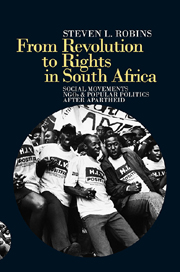 From Revolution to Rights in South Africa
From Revolution to Rights in South Africa From Revolution to Rights
Published online by Cambridge University Press: 05 April 2013
We did not say our struggle against apartheid was a civil rights struggle. We said it was a liberation struggle. There is actually a difference … A liberation struggle includes socioeconomic issues, it includes power relations. It includes structures of society, etc. Whereas civil rights is a legalistic notion. For instance, you would agree, surely, if we change the law on the rights of women with respect to property that would not actually emancipate women … So, when people were talking today, in the [G8 Parliamentary Conference] meeting about women's rights, it was quite a limited, legalistic formulation. (Professor Ben Turok, an African National Congress Member of Parliament, New Agenda, Issue 19, 2005:14–15). Discourses of rights and responsibilities conveniently cast the powers of economy and state as relatively benign at a historical moment when both seem nearly unassailable anyway.
(Brown 1995: xiii)Introduction
During South Africa's first decade of democracy, cultural rights claims took varied and fascinating forms. For example, shortly after the arrival of democracy in 1994, delegations of middle-class white Afrikaners converged on UN-sponsored indigenous rights meetings in Geneva and elsewhere claiming to be indigenous peoples just like the Inuit, the San, Aborigines, Maoris, and so on. At roughly the same time, similarly minded Afrikaners established the all-white Volkstaat (Homeland) of Oranje in an attempt to live out their ideals of ethnic self-determination in a post-apartheid constitutional democracy that protected language and cultural rights.
To save this book to your Kindle, first ensure no-reply@cambridge.org is added to your Approved Personal Document E-mail List under your Personal Document Settings on the Manage Your Content and Devices page of your Amazon account. Then enter the ‘name’ part of your Kindle email address below. Find out more about saving to your Kindle.
Note you can select to save to either the @free.kindle.com or @kindle.com variations. ‘@free.kindle.com’ emails are free but can only be saved to your device when it is connected to wi-fi. ‘@kindle.com’ emails can be delivered even when you are not connected to wi-fi, but note that service fees apply.
Find out more about the Kindle Personal Document Service.
To save content items to your account, please confirm that you agree to abide by our usage policies. If this is the first time you use this feature, you will be asked to authorise Cambridge Core to connect with your account. Find out more about saving content to Dropbox.
To save content items to your account, please confirm that you agree to abide by our usage policies. If this is the first time you use this feature, you will be asked to authorise Cambridge Core to connect with your account. Find out more about saving content to Google Drive.